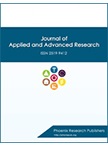Stakeholders' Perception: Stakeholders’ perception: E-Learning initiatives in school education of Rajasthan state in the course of COVID-19
DOI:
https://doi.org/10.21839/jaar.2024.v9.9039Keywords:
COVID-19, Online-learning, Online/e-learning initiatives, School educationAbstract
The COVID-19 pandemic led to increased adoption of e-learning in academic institutions, leading to the adoption of digital learning initiatives in Rajasthan. Projects-like SMILE, ‘Shikshadarshan - Educational T-DD Rajasthan’, ‘Shikshavani - Education via Radio’, ‘Hawamahal- Joyful Saturday program’, and ‘YouTube Rajiv Gandhi Career Portal’ were implemented. This study aimed to understand stakeholders’ perceptions of e-learning initiatives in Rajasthan and the global transformation of the education system. A descriptive survey conducted on 308 stakeholders from five government schools in Dungarpur district. The study reveals that 89% of students in Rajasthan state use smartphones for online classes, using WhatsApp video links, e-Raksha apps, YouTube, and open learning sources like Google. However, students often need help with language problems in content provided through e-learning initiatives, possibly due to the absence of their local language. Teachers are aware of e-learning initiatives but must be fully aware of them. Many teachers believe digital teaching-learning approaches make teaching plans and assessments more complex than face-to-face teaching. Parents and community members agree that their children can adopt e-learning comfortably, but 63% are unsatisfied with e-learning during COVID-19. Most participants agree that face-to-face teaching is better than e-learning and that the focus should be on face-to-face learning. The government should consider local languages for online videos and live programs. The department should include training programs for online learning resources in post-service education and teacher training to implement effective online education.
Downloads
References
Balbay, S., & Kilis, S. (2017). Students' Perceptions of the Use of a YouTube Channel Specifically Designed for an Academic Presentations Skills Course. Eurasian Journal of Applied Linguistics, 3(2), 235-251. https://doi.org/10.32601/ejal.461003
Bouhnik, D., & Deshen, M. (2014). WhatsApp goes to school: Mobile instant messaging between teachers and students. Journal of Information Technology Education: Research, 13, 217-231. https://doi.org/10.28945/2051
Burgess, S., & Sievertsen, H. H. (2020). Schools, Skills, and Learning: The Impact of COVID-19 on Education.
Cetinkaya, L. (2017). The Impact of Whatsapp Use on Success in Education Process. The International Review of Research in Open and Distributed Learning, 18(7), 59-74. https://doi.org/10.19173/irrodl.v18i7.3279
Fine, K. A. (2016). Online Education: The Relationship Between the Perceptions of Online High School Teachers Compared to Traditional Classroom Teachers Regarding the Visual Arts. Doctoral Dissertation, East Tennessee State University.
Gon, S., & Rawekar, A. (2017). Effectivity of E-Learning through Whatsapp as a Teaching Learning Tool. MVP Journal of Medical Sciences, 4(1), 19-25. https://doi.org/10.18311/mvpjms.v4i1.8454
Kumar, P., Kumar, P., Garg, R. K., Panwar, M., & Aggarwal, V. (2022). A study on teachers' perception towards E-learning adoption in higher educational institutions in India during the COVID-19 pandemic. Higher Education, Skills and Work-Based Learning, 13(4), 720-738. https://doi.org/10.1108/HESWBL-03-2022-0052
Kumari, A., & Singh, V. (2021). Perception of Secondary School Teachers for Online-learning during COVID-19. Journal of Teacher Education and Research, 16(2), 1-6. https://doi.org/10.36268/JTER/16201
Pathak, A., Makwana, K., & Sharma, P. (2019). A study on student's perception and attitude towards e-learning. Journal of the Gujarat Research Society, 21(16), 274-282.
Rose, S. M. (2018). What are some key attributes of effective online teachers? Journal of Open, Flexible and Distance Learning, 22(2), 32-48.
Sharma, B., Sankpal, D. S., & Gulati, D. C. (2020). Factors Affecting the Perception of Students Towards E-Learning. International Journal of Management, 11(10), 1885-1896.
Zamzuria, Z. F., Manaf, M., Yunus, Y., & Ahmad, A. (2013). Student perception on security requirement of e-learning services. Procedia - Social and Behavioral Sciences, 90, 923-930. https://doi.org/10.1016/j.sbspro.2013.07.169





 .
.